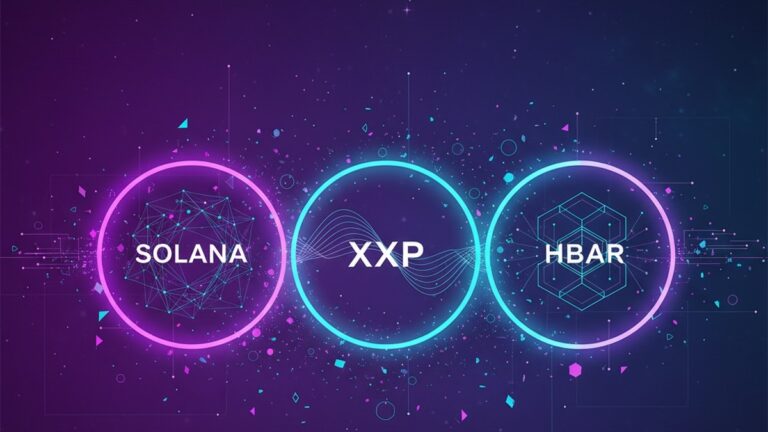The recent listing of Solana, XRP, and HBAR exchange-traded funds (ETFs) on the Depository Trust & Clearing Corporation (DTCC) has ignited a wave of excitement across the cryptocurrency community. However, whether this development marks a significant step towards broader acceptance or is merely another instance of overblown hype remains a topic of debate.
A Step Forward or Just a Formality?
For many, the DTCC listing represents a milestone, suggesting a growing institutional recognition of digital assets. This action, however, is primarily a technical step in the complex process of launching an ETF, not an outright endorsement. The DTCC, a key player in financial market infrastructure, simply facilitates the clearing and settlement of securities transactions. Therefore, while the listing indicates some level of readiness to handle these ETFs, it doesn’t equate to a green light for trading.
The real determinant of these ETFs’ future lies with the U.S. Securities and Exchange Commission (SEC), the regulatory body that will ultimately decide if they can be marketed and traded. The SEC’s approval is a significant hurdle, particularly given its historically cautious stance towards cryptocurrency ETFs. Thus, while the DTCC listing is promising, it doesn’t guarantee that these ETFs will grace investors’ portfolios anytime soon.
The Appeal of Altcoin ETFs
The potential launch of ETFs for Solana, XRP, and HBAR is intriguing for several reasons. These altcoins have garnered substantial attention due to their unique offerings and technological advancements. Solana, often lauded for its high throughput and low transaction costs, has been a favorite among developers building decentralized applications. XRP, on the other hand, is known for its utility in cross-border payments, while HBAR, the native token of Hedera Hashgraph, is praised for its energy-efficient consensus algorithm.
Investors are eager to gain exposure to these assets through an ETF, which offers a regulated and convenient way to invest without directly purchasing and storing the cryptocurrencies. ETFs also provide a level of diversification and reduce the complexities associated with managing digital wallets.
Caution from Regulators
Despite the enthusiasm, regulatory concerns cannot be overlooked. The SEC has been wary of approving cryptocurrency ETFs, citing issues such as market manipulation, liquidity, and the absence of robust surveillance mechanisms. These concerns remain pertinent, especially as the market continues to mature and evolve.
In the past, the SEC has rejected or delayed decisions on numerous Bitcoin and Ethereum ETF proposals, emphasizing the need for comprehensive risk management frameworks. The question now is whether Solana, XRP, and HBAR can overcome these hurdles and present a convincing case for approval.
A Mixed Market Reaction
The market’s reaction to the DTCC listing has been mixed. On one hand, it has fueled optimism among crypto enthusiasts who view it as a sign of growing acceptance and integration into the traditional financial system. On the other hand, skeptics argue that without SEC approval, the listing is little more than a procedural step.
Some analysts believe that even if these ETFs gain approval, their impact might be limited initially. The market is already familiar with the volatility of cryptocurrencies, and investors may remain cautious until the ETFs prove their stability and profitability.
The Road Ahead
Looking ahead, the fate of Solana, XRP, and HBAR ETFs rests heavily on the SEC’s decision-making process. While the DTCC listing is an encouraging development, it should be viewed as part of a broader journey towards regulatory acceptance. The SEC’s stance in the coming months will be crucial in determining whether these ETFs can navigate the regulatory landscape successfully.
In conclusion, the DTCC listing of Solana, XRP, and HBAR ETFs is a noteworthy development that underscores the growing interest in altcoin investments. However, it’s essential to maintain a balanced perspective and recognize that significant regulatory challenges remain. As the cryptocurrency market continues to evolve, investors and stakeholders alike will be watching closely to see if these ETFs can move from mere listings to fully-fledged investment options.

Steve Gregory is a lawyer in the United States who specializes in licensing for cryptocurrency companies and products. Steve began his career as an attorney in 2015 but made the switch to working in cryptocurrency full time shortly after joining the original team at Gemini Trust Company, an early cryptocurrency exchange based in New York City. Steve then joined CEX.io and was able to launch their regulated US-based cryptocurrency. Steve then went on to become the CEO at currency.com when he ran for four years and was able to lead currency.com to being fully acquired in 2025.


